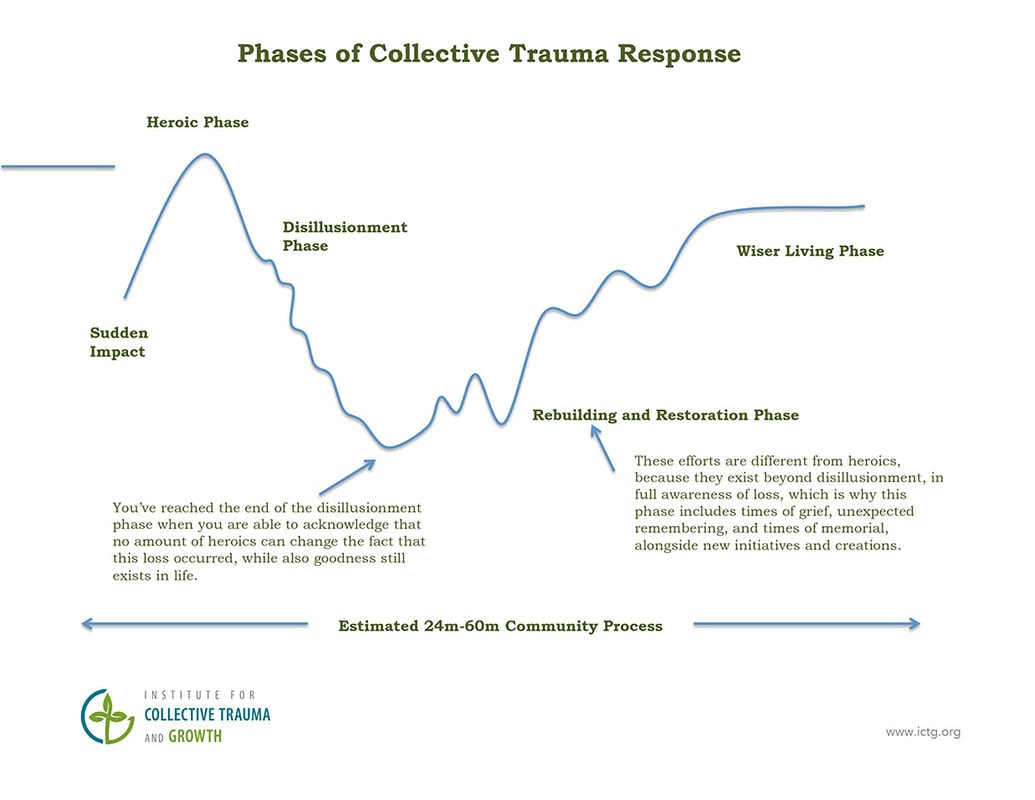|
This post originally was published on September 11, 2018, on the ICTG blog.
These days it can feel as though there are few places to turn where you do not encounter the impacts of trauma in some form. Whether you are marking the 17th anniversary of 9/11 today or the one-year anniversaries of hurricanes Irma, Harvey, and Maria, or you are preparing for the incoming storms of Florence or Olivia, you are in the thick of your own crises related to flooding, violence, fire, substance abuse, depression, anxiety, death, or terminal illness – it can be hard not to feel overwhelmed and even hopeless amid the chaos of heartache.
Trauma, of course, is not new. Though it may be decades or even centuries since events like the ones we face today have occurred, the sustainable practices of resiliency remain the same across time and demographics. Here are some of the ways leading field experts, journalists, and scholars are naming them today: Pediatrician and leading Adverse Childhood Experiences (ACEs) scholar, Dr. Nadine Burke-Harris on the prescription plan for countering adversity:
Collective traumatologist,Dr. Jack Saul, on the four themes most typical of a functional community resilience and recovery approach:
Pastoral theologian, Dr. John Swinton, on the relational and spiritual practices for formation through and beyond loss:
These practices are not merely about being "good" or "healthy." They are proven to be the skills and practices that sustain individuals, families, and groups through widely ranging forms of loss. To learn more about how you or your organization can practice skills for resiliency, browse ICTG's downloadable guides, training materials, or contact us to learn more.
Help sustain online education by making a financial contribution today or becoming a monthly donor. Thank you for your generosity!
0 Comments
This post, written by Rev. Dr. Kate Wiebe, originally was published June 17, 2019, on the ICTG blog. Almost two years ago now, board director emeritus and former clinical psychologist, Rev. Dr. Gordon Hess, PhD, wrote on this blog. It's about how ICTG started out five years ahead of the curve on topics of trauma, groups, and communities. It may be hard to believe, especially these days when it can seem like nearly everyone is talking about trauma, PTSD, brain science, fight/flight reactions, and long-term impacts of adversity, but back when ICTG was starting in 2012 it felt like hardly anyone was talking about these critical issues. We reviewed the original ACEs study and considered how those statistics may be reflected in schools, congregations, and businesses. Then we compared that with the types of disasters that had occurred around the country during the early 2000s. We saw an immense need to inform organizational leaders and provide coaching and therapeutic services for them. Our tremendous donors, volunteers, and staff have been doing that ever since. Though we're immensely grateful to see more resources becoming available to organizational leaders, we see that many resources, like the Phases of Disaster Response, and the current categories for disaster funding (which segment according to the type of incident that has occurred, such as a tornado or a wildfire or an act of terror), do not fit the mold of challenges communities are facing today. This great disparity further complicates, frustrates, and hinders the healing and restoration processes for survivors. We can do so much better. Of course, our country has always had communities facing compounding traumatic stress, particularly in cases where neighborhoods experienced oppression, hatred, poverty, addictions, and violence on an ongoing basis. Thankfully, organizations like the Equal Justice Initiative that is helping the country come to terms and make amends to great wrongs we have caused or perpetuated, and Fearless Dialogues that is helping people recognize our mutual humanity and work for change. Now, the same communities that have experienced decades of heartache and destruction, as well as communities that have experienced far more privileged circumstances, all are facing additional cascading tragedies. These include multiple natural disasters within close proximity, or combinations of natural and human-caused disasters, or combinations of natural and technological disasters, or disasters in communities amid overwhelming rates of opioid addictions and suicide. We must all do our part to consider the ways we can sustain ourselves and our neighbors amid impacts of trauma and disaster, add good back into a troubled world each day, and share strength and nourishment we have to offer to others as we go. Beyond our blogs, some of the ways that donors, volunteers, and staff at ICTG are making a difference is by providing a range of support for leaders. Leaders often need and want:
Please do not hesitate to reach out if you think any of these resources may be helpful to you. If you would like to encourage this critical work, I invite you to make a financial contribution today. Your generosity makes a great difference! Thank you.
Our mission for this Community Blog is to share a variety of resources and stories to support you and your community as you prepare for, respond to, and recover from traumatic events. It is our fervent hope that through this blog you are inspired to consider how you might support your community before a traumatic event happens, encouraged as you respond to an event one day and one step at a time, and sustained through the long, hard days of recovery. Every community is different and every trauma looks and feels unique. So, while this blog will share ideas and examples of how others have survived and grown through trauma, your community and your situation will not necessarily fit into someone else’s recovery mold. ICTG’s team of professionals are ready and willing to talk to you about your specific needs. If you are curious, please reach out at [email protected].
“Great leaders are not defined by the absence of weakness, but rather by the presence of clear strengths.” John Zenger
The start of a traumatic event is a marked point in time between how life was and what it is now. As leaders, we are tasked with guiding our community through that difficult time of change. The ICTG Community Blog will share best practices and resources to help you as you address trauma and offer support as you provide leadership and care for your community. The following information can be helpful for recognizing the symptoms of trauma and for starting to offer care to your community.
According to the Centers for Disease Control and Prevention (CDC), there are a number of symptoms that a person who has undergone trauma may experience:
While these are natural physical, emotional, and mental responses to a traumatic event, some people and communities have a difficult time sharing that they are experiencing symptoms. They may feel like no one can understand their pain, embarrassed that they can’t “handle it on their own,” or may be dealing with feelings of survivor’s guilt. Whatever the reason, they are still experiencing symptoms that can negatively impact their quality of life and that can hinder your community’s recovery. As leaders, we need to be aware of and looking for symptoms of trauma, and understand that members of our community may be suffering, even if we can’t see it ourselves. These tips from the CDC on dealing with trauma are broad enough to cover a variety of situations and can be shared with individuals or your community at large:
Sustain free online education by making a contribution today. Your generosity makes a great difference!
|
�
COMMUNITY BLOGFrom 2012-2021, this blog space explored expanding understanding and best practices for leadership and whole-community care.
This website serves as a historical mark of work the Institute conducted prior to 2022. This website is no longer updated. Archives
January 2021
Categories
All
|






 RSS Feed
RSS Feed
